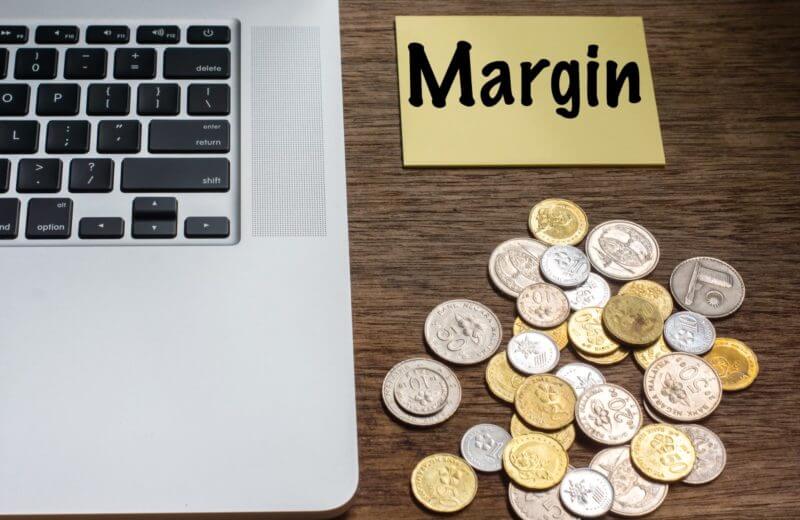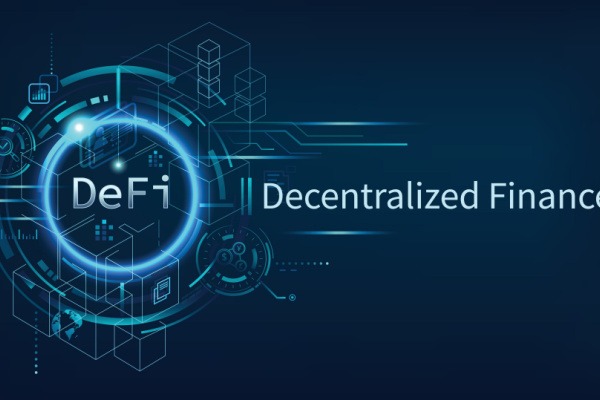Blockchain represents a revolutionary advancement in the field of data management and security. It is a list of records, or “blocks,” stored publicly and chronologically.
Each block is secured using cryptographic techniques, ensuring its information remains immutable and tamper-proof once recorded.
This decentralised structure eliminates the need for a central authority, fostering transparency and trust in digital transactions and data storage.
Furthermore, blockchain’s ability to provide a secure, transparent, and unalterable record has significant implications across various industries.
In this article, we will explore the extensive applications of blockchain technology and the steps for implementing blockchain solutions and discuss the prospects of this transformative technology.
Blockchain in Financial Services
The financial services industry stands to benefit immensely from blockchain technology. According to IDC, corporate and government spending on blockchain technology was projected to increase by 89% over 2018, reaching nearly $3 billion in 2019 and surpassing $12 billion by 2022. This surge in investment underscores the industry’s recognition of blockchain’s potential to revolutionise financial operations.
Blockchain simplifies cross-border payments by providing a decentralised ledger that reduces the need for intermediaries, thereby cutting costs and speeding up transactions. Additionally, the technology enhances fraud prevention mechanisms by creating an immutable record of transactions, making it difficult for malicious actors to manipulate data. Financial institutions can also leverage blockchain to improve transparency and compliance, ensuring all transactions are easily auditable and verifiable.
Enhancing Supply Chain Management
Supply chain management is another area where blockchain’s impact is profound. By providing an immutable ledger, blockchain enhances transparency across the entire supply chain, from production to delivery. This transparency helps reduce fraud, counterfeiting, and discrepancies in supply chain records, thereby increasing stakeholder efficiency and trust.
Blockchain optimises logistics operations by enabling real-time tracking of goods. For instance, each transaction or movement of goods can be recorded. This allows all parties to access the same data and ensures the information is accurate and up-to-date. This capability improves operational efficiency and enhances the ability to respond quickly to any issues or delays that may arise.

Revolutionising Healthcare
In the healthcare sector, blockchain technology ensures the integrity and confidentiality of patient data. Decentralised and secure platforms for storing and sharing medical records facilitate interoperability among healthcare systems while ensuring compliance with data protection regulations. This capability is crucial in an industry where data security and patient privacy are paramount.
Applications in Healthcare
- Electronic Health Records (EHRs): They allow for secure and efficient management of EHRs, enabling patients and healthcare providers to access and share medical information seamlessly and securely.
- Pharmaceutical Supply Chain Management: They help track pharmaceuticals from production to distribution, reducing the risk of counterfeit drugs entering the market and ensuring that medications are safe and authentic.
- Clinical Trials Management: It enhances the transparency and integrity of clinical trial data, ensuring that results are accurate and tamper-proof, essential for regulatory compliance and public trust.
- Healthcare Billing and Payments: It streamlines billing processes, reducing administrative costs and fraud and ensuring that payments are processed efficiently and accurately.
Securing Voting Systems
Blockchain technology offers a tamper-proof and transparent platform for conducting elections, ensuring secure and verifiable electronic voting. By recording votes on a blockchain, the risk of manipulation is significantly reduced, enhancing voter trust and the overall integrity of the electoral process.
Moreover, blockchain-based voting systems provide a transparent and immutable record of each vote, which all stakeholders can independently verify. This transparency ensures accurate and fraud-free results, making it a compelling solution for governmental and organisational elections.
Protecting Intellectual Property Rights
The technology provides a decentralised and transparent solution for managing intellectual property rights. Creators can use blockchain to prove the authenticity and ownership of their work, ensuring that their intellectual property is protected from unauthorised use or infringement.
For instance, smart contracts, which are self-executing contracts with the terms of the agreement directly written into code, can automate the enforcement of intellectual property agreements. This automation reduces the need for intermediaries and ensures that creators receive fair compensation for their work, fostering innovation and creativity.
Implementing Blockchain Solutions
Successfully implementing this technology requires a strategic approach. Here are the key steps to consider:
- Identify Use Cases: Assess the company’s pain points and operational inefficiencies to determine where blockchain can streamline operations, enhance transparency, or improve data security. This step involves understanding the specific needs and challenges of the organisation and evaluating how blockchain can address them effectively.
- Select the Platform: Choose a blockchain platform that aligns with industry requirements, considering factors such as scalability, security features, and interoperability. Different blockchain platforms offer varying capabilities, so selecting one that meets the organisation’s specific needs and goals is essential.
- Collaborate with Partners: Work closely to integrate blockchain into existing systems and processes to maximise benefits. This collaboration involves engaging stakeholders across the supply chain, financial institutions, and technology providers to ensure a seamless and effective implementation.

Blockchain and Cybersecurity
Blockchain enhances security in financial transactions by providing immutable records and reducing the risk of fraud compared to centralised systems. For example, blockchain’s decentralised nature in financial transactions makes it difficult for cybercriminals to alter records without detection. This security feature is critical in an increasingly sophisticated and pervasive era of cyber threats.
By decentralising data storage and employing cryptographic techniques, blockchain reduces the risk of data breaches and ensures that sensitive information remains secure. Therefore, enhanced security is crucial for finance, healthcare, and supply chain management, ensuring data integrity and confidentiality are maintained.
Blockchain in Loyalty Rewards Programs
Companies like Gyft and Loyal are using blockchain to revolutionise loyalty rewards programs. The technology lets companies reward customers with tokens, reducing fraud risk and eliminating third-party financial transaction management. Therefore, this approach enhances the security and efficiency of loyalty programs. Furthermore, it provides customers with a more seamless and rewarding experience.
Blockchain-based loyalty programs eliminate the need for physical loyalty cards, reducing card waste and environmental impact. Additionally, using tokens simplifies earning and redeeming rewards, making it easier for customers to participate and for companies to manage their programs.
Blockchain in the Music Industry
The music industry is exploring the potential of blockchain to streamline content creation, sharing, licensing, distribution, digital use, payments, and royalties for artists. Projects like Mycelia, spearheaded by artist Imogen Heap, aim to give musicians more control over their assets and distribution. Similarly, JAAK, a pilot program, seeks to address royalty payment issues and ensure that artists receive fair compensation for their work.
Blockchain ensures a transparent and secure platform for managing music rights and properly crediting and compensating artists for their creations. Blockchain can streamline royalty distribution and protect intellectual property in music by automating payments and eliminating intermediaries.
Potential Applications in Weapons Tracking
Blockchain can globally track weapons from manufacture to sale, preventing illegal arms sales on the black market. Recording every transaction on the blockchain allows authorities to trace a weapon’s history. Furthermore, it ensures the weapon’s lawful usage.
This transparency can reduce illegal weapon proliferation and enhance efforts to combat gun violence and terrorism. Blockchain-based tracking systems can also improve accountability and compliance with international arms trade regulations.
Other Applications
Blockchain’s versatility extends to other applications, including insurance, real estate, and healthcare. In the insurance industry, blockchain can eliminate forgeries and prevent false claims by providing a transparent and immutable record of insurance policies and claims. This capability can reduce fraud and streamline claims, benefiting insurers and policyholders.
Moreover, real estate can increase the speed of the conveyance process and eliminate the necessity for money exchanges by providing a secure and transparent platform for property transactions. This transparency reduces the risk of fraud and ensures that all parties have access to accurate and up-to-date information.
In healthcare, it can keep important patient data safe and secure due to its incorruptibility, decentralisation, and transparency. It ensures accurate, tamper-proof medical records, improving patient care and aiding better decision-making by healthcare providers.

The Future of Blockchain
Blockchain technology’s potential extends far beyond cryptocurrencies, with significant implications for democracy, monetary transactions, supply chain management, and more. As industries continue to explore and implement blockchain solutions, mastering this technology can provide a significant career advantage.
Individuals can pursue educational opportunities such as Simplilearn’s Blockchain Certification course to understand blockchain and its applications better. This course equips learners with the knowledge and skills to understand blockchain concepts and build applications. It prepares them for a future where blockchain technology is crucial in various industries.
Conclusion
Blockchain represents a transformative force that can enhance transparency, security, and efficiency across various applications. As technology evolves, its growing impact makes it crucial for businesses and individuals to stay informed and engaged with innovation.
















